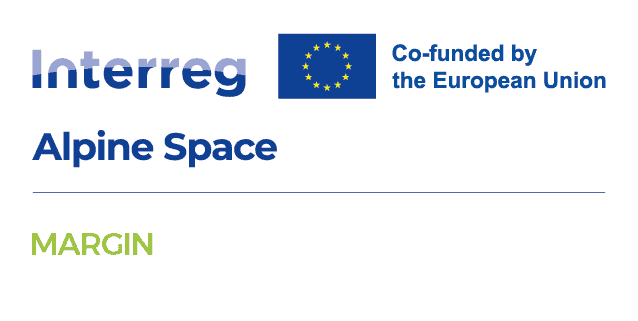
Overview
Alpine cities face unique groundwater issues, including the impact of climate change and rising competition for groundwater use. To address these concerns, MARGIN helps cities understand their vulnerability and risk, building resilience to future groundwater changes. The project offers city-tailored management for upcoming groundwater difficulties, creating the potential to replicate best practices and accelerate their implementation in Alpine cities, thus strengthening preparedness and capacity to cope with the impacts of climate change.
Factsheet
- 2021 – 2027
- Climate resilient and green Alpine region
- SO 1.1 - Promoting climate change adaptation and disaster risk prevention, resilience, taking into account eco-system based approaches
-
- AG6 Natural resources
- AG8 Risk governance
- AG9 Energy efficiency and renewable energy
- 09/2024
- 08/2027
- 2.985.084 EUR
- 2.238.813 EUR
Partners
- 48.1490727511.567444920339295
- 46.0498090514.50707959564592
- 45.46666019.1904174
- 48.13778811.575343667017169
- 48.280808514.3093233
- 48.24862595000000516.356562264678487
- 46.0708530514.5146146672204
- 45.51829759.2137546
- 48.213128416.360685994114505
- 46.051076614.46985
- 50.117673858.636413400398371
- 50.7747373499999957.2773661976965




























Outcomes
-
Catalogue of fact sheets for the current state of groundwater management in Alpine cities and needs for future challenges, assessed in pilot cities by a transnationally transferable approach
The catalogue of fact sheets describes current data handling, on-site management and adaption strategies, as well as country-specific/regional regulations and policies regarding present groundwater risks and adaptation measures in the pilot cities. The fact sheets outline lacks, barriers and requirements for a groundwater sustainability management, identified via stakeholder interaction. A general approach for this assessment is deviated from outcomes and lessons learned in the pilot cities. -
Validation of groundwater potential, risk assessment and recommendations for development of adaption strategies in Alpine space pilot cities
Potential and risk assessments are demonstrated and validated in pilot cities by applying harmonized transferable approaches, which feed into O2.2. Data by pilot cities serve as input for the assessment, are supplemented by new field data and jointly analysed by all PPs. Assessment results are cross-checked with relevant cities’ stakeholders (O1.1) and transmissive recommendations for development of adaptation strategies are evolved. Factsheets and maps create awareness in the cities and beyond -
Guideline to assess groundwater potentials and risks due to climate change impacts and urbanization, including recommendations for the development of adaptation strategies on city-scale
The guideline comprises approaches to assess groundwater potentials based on quantity and quality, as well as impacts of climate change and urbanization induced groundwater changes on various city values and ecosystem health. The approach to assess risks builds on jointly defined, transnationally applicable vulnerability and risk indicators (e.g. protocols for biodiversity assessment) and on specific city needs and conditions (O1.1), incl. recommendations to develop adaption strategies. -
Validating best practice for implementation of groundwater sustainability management at pilot cities in the Alpine space
Validation of the successful implementation of groundwater sustainability management in pilot cities applying transferable guidelines, approaches and tools from the toolbox (A3.3). The assessments and strategies approaches will be implemented and tested i) in the groundwater management tool (GEO.KW web app) used by the Munich City administration, ii) in Milan integrated and combined in provided urban-scale models iii) in other pilot and observer cities depending on the evaluated capabilities. -
Toolbox for implementation of Groundwater Sustainability Management on city level to build climate resilience and promote a sustainable use of potentials
The toolbox for implementation of a user-oriented Groundwater Sustainability Management regarding future groundwater changes in cities includes: tailored guidelines for city administrations to conduct and implement a management structure into city’s administration/for data-handling and monitoring/for vulnerability and risks assessment, catalogue of evaluated adaptation strategies, measures and implementation in policy instruments, gamebook, best practice examples and tools.


